Unit 3 Could you please tell me where the restrooms are?Section B 2a-2c 课件(共33张PPT) 人教版英语九年级全册
文档属性
| 名称 | Unit 3 Could you please tell me where the restrooms are?Section B 2a-2c 课件(共33张PPT) 人教版英语九年级全册 | 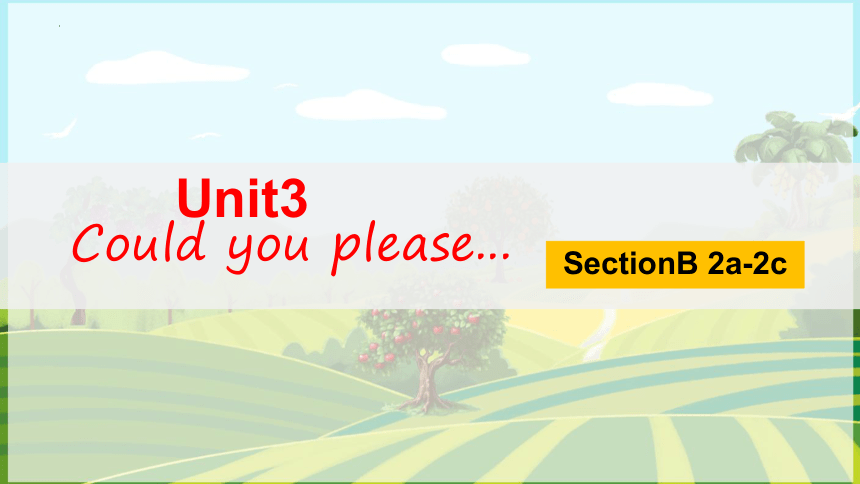 | |
| 格式 | pptx | ||
| 文件大小 | 5.2MB | ||
| 资源类型 | 教案 | ||
| 版本资源 | 人教新目标(Go for it)版 | ||
| 科目 | 英语 | ||
| 更新时间 | 2024-09-03 10:20:45 | ||
图片预览

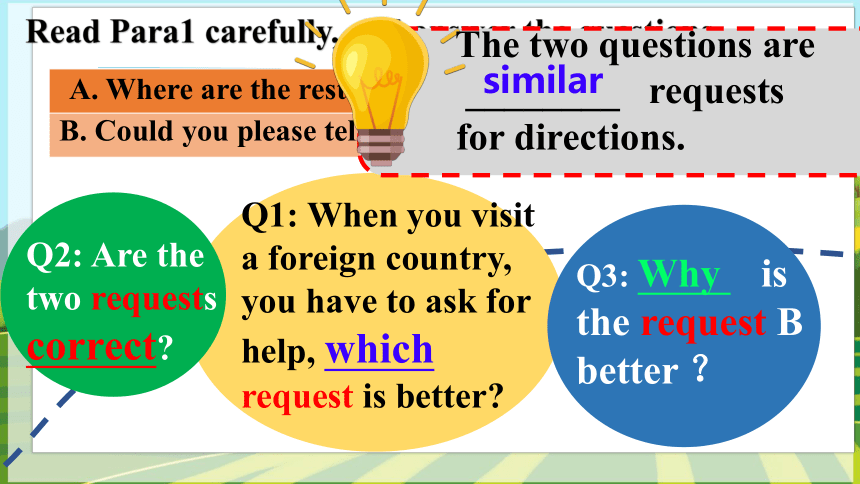
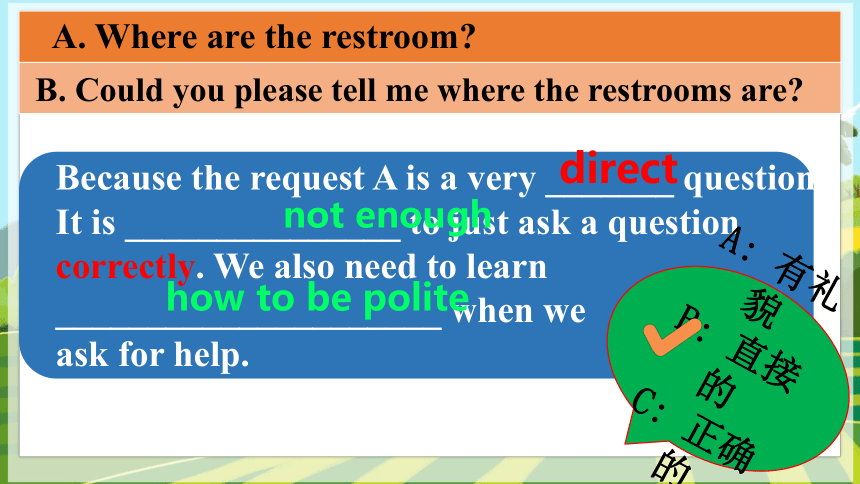
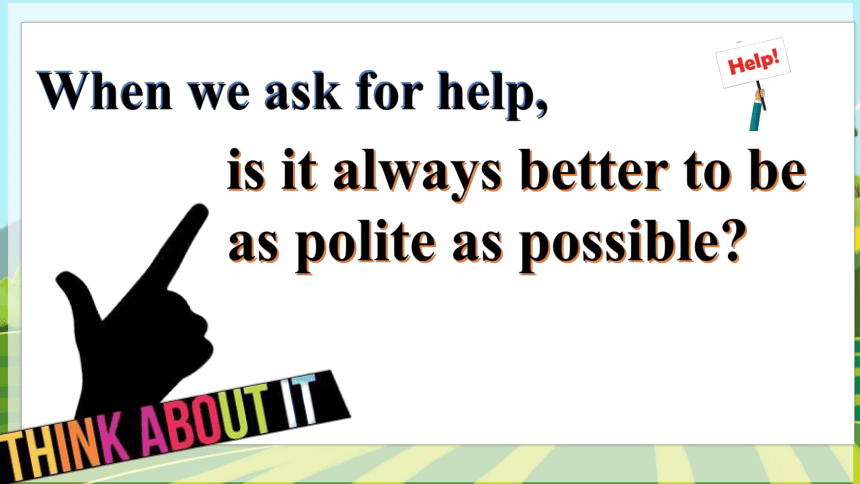
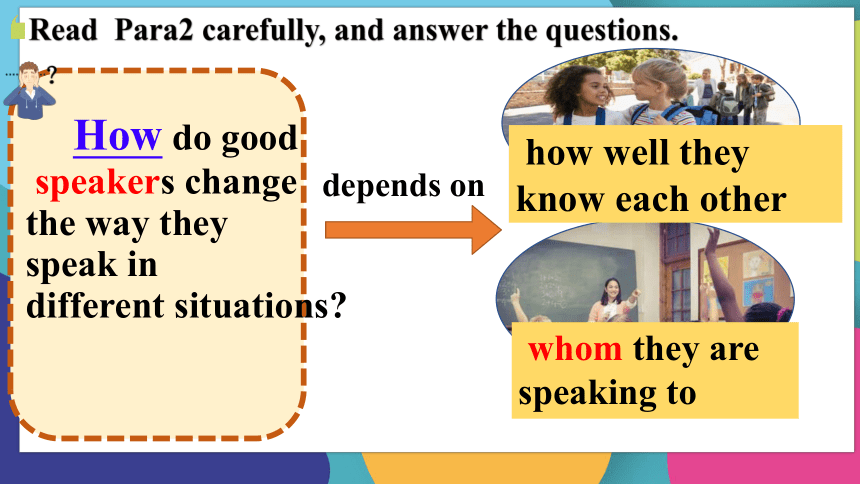
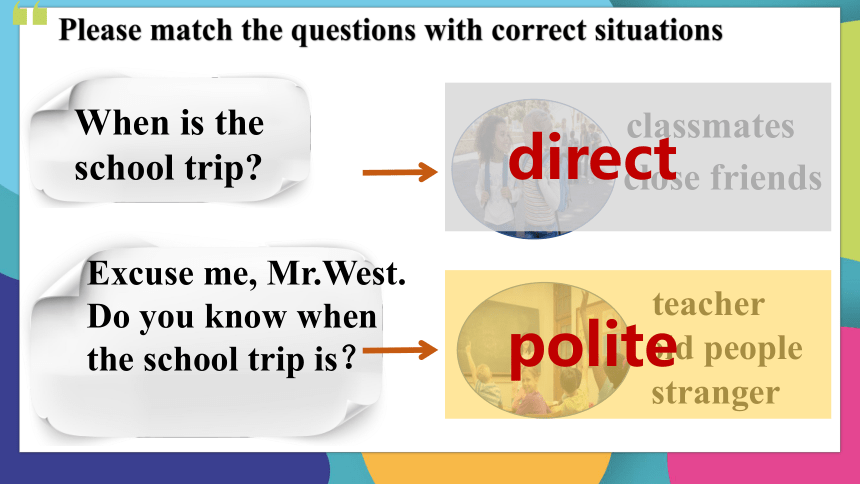
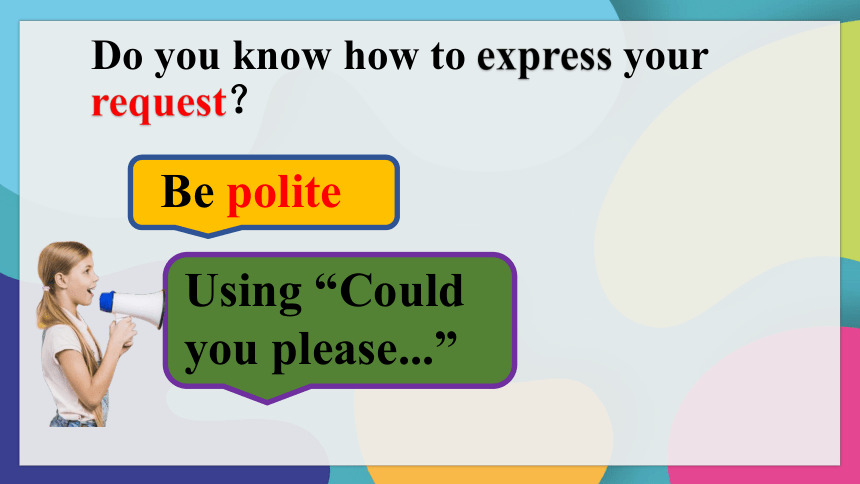
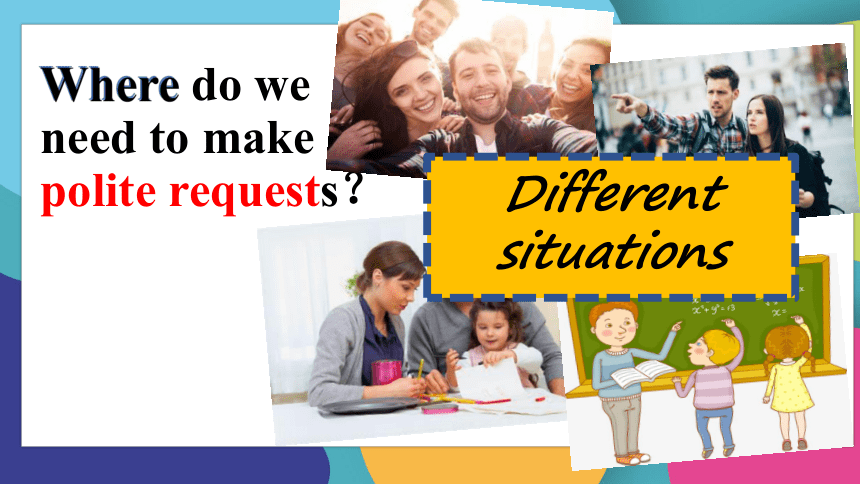
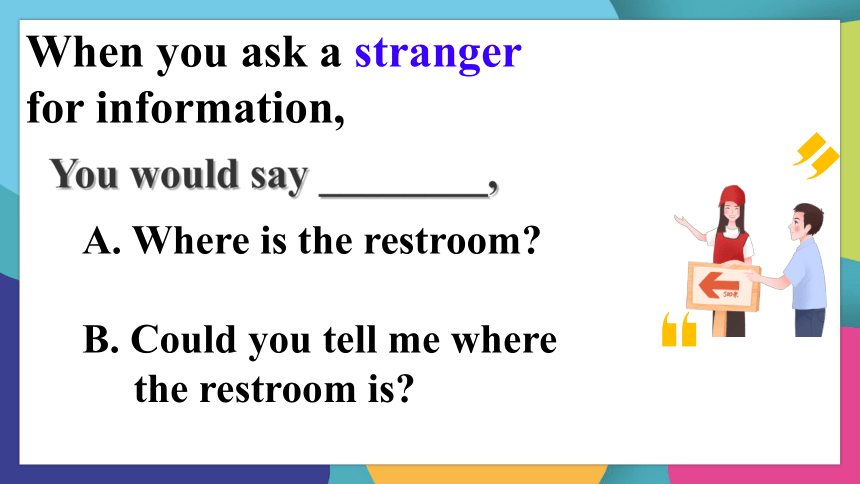
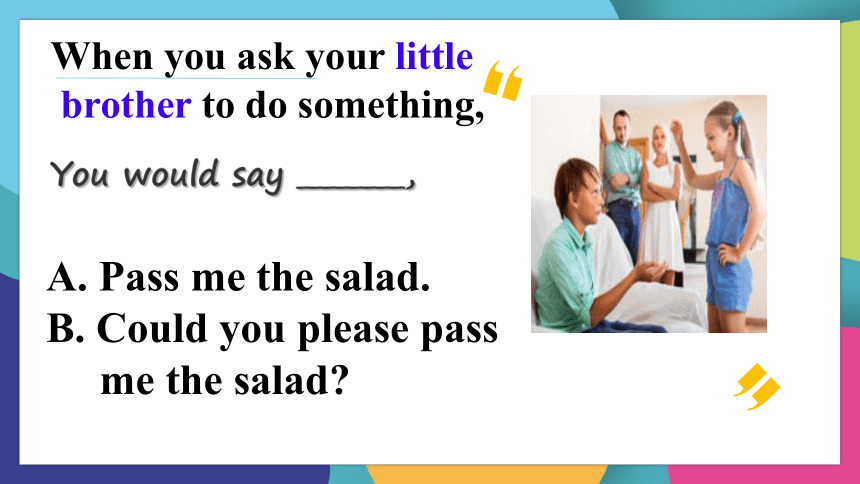
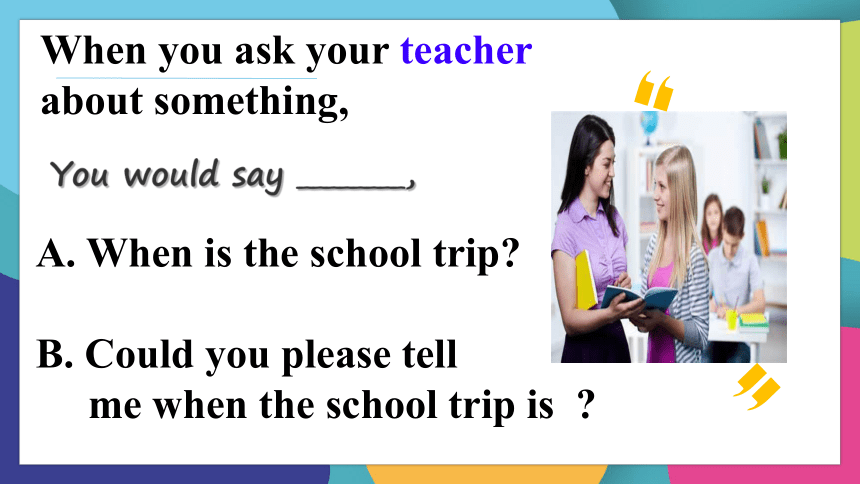
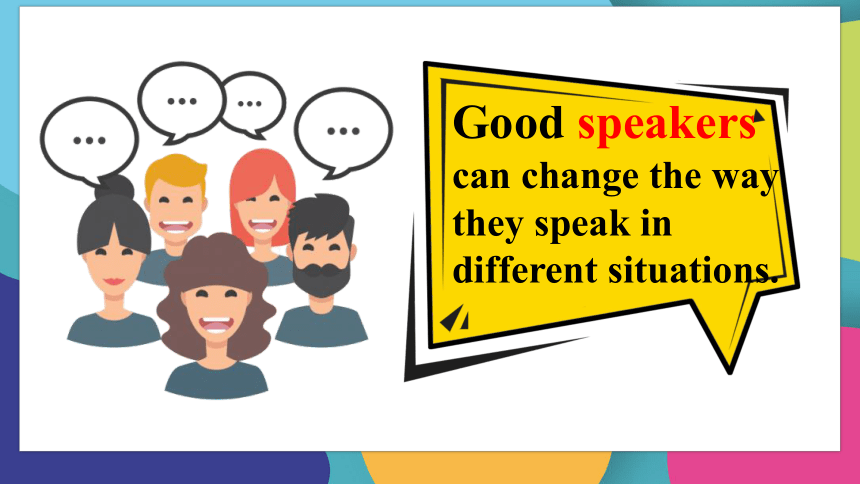
文档简介
(共33张PPT)
Unit3
Could you please...
SectionB 2a-2c
Read Para1 carefully, and answer the questions.
B. Could you please tell me where the restrooms are
A. Where are the restrooms
Q1: When you visit a foreign country, you have to ask for help, which request is better
Q2: Are the
two requests
correct
The two questions are
________ requests
for directions.
similar
Q3: Why is
the request B
better ?
B. Could you please tell me where the restrooms are
A. Where are the restroom
Because the request A is a very _______ question. It is _______________ to just ask a question correctly. We also need to learn _____________________ when we
ask for help.
direct
not enough
how to be polite
A: 有礼貌
B: 直接的
C: 正确的
When we ask for help,
is it always better to be as polite as possible
HOw
Read Para2 carefully, and answer the questions.
How do good
speakers change
the way they
speak in
different situations
depends on
how well they know each other
whom they are speaking to
Please match the questions with correct situations
When is the school trip
Excuse me, Mr.West. Do you know when the school trip is?
classmates
close friends
teacher
direct
old people
stranger
polite
Do you know how to express your request?
Be polite
Using “Could you please...”
Where do we
need to make polite requests?
Different situations
When you ask a stranger
for information,
You would say ________,
A. Where is the restroom
B. Could you tell me where
the restroom is
When you ask your little
brother to do something,
You would say ________,
A. Pass me the salad.
B. Could you please pass
me the salad
When you ask your teacher
about something,
You would say ________,
A. When is the school trip
B. Could you please tell
me when the school trip is
Good speakers can change the way they speak in different situations.
How
What can you learn from their
dialogues
polite
impolite
direct
long
Underline
the topic sentence of each paragraph.
When you visit a foreign country, it is important to know how to ask for help politely.
Usually polite questions are longer.
It is important to learn how to use the right language in different situations.
Topic
Good speakers change the way they speak in different situations.
Conclusion
Opinions +
examples
In different situations , you need to choose and use suitable language based on
cultural knowledge.
based on
建立在......
Para3.
Usually
polite questions
are longer. Why
Could you please...
May I ask...
Excuse me. I wonder if you can help.
I'm sorry to trouble you ,but......
Longer questions can be more ______ and we need to spend time ____________________before asking for help.
polite
leading into a request
Read Para 4 and answer the questions.
In the writer's opinion,
is it important to speak politely or directly
What's the purpose(目的)
Neither one.
It is important to learn how to use the right language in different situations.
This will help you communicate better with other people.
Different situations,
using the right
language.
Find all the direct questions and polite requests from the passage.
Direct questions
Polite questions
Where are the restrooms
When is the school trip
Peter, tell me your
e-mail address
Could you tell me where the restrooms are
Excuse me, Mr. West. Do you know when the school trip is
Peter, could you please tell me your e-mail address
2c
Read the request below. In the second column, write A if you would say it to someone you know and B if you would say it to a stranger. In the last column, write where you think these people are.
Request Person Place
1. Will you pass the salt
2. Do you know where I can change some money, please
3. Could you tell me what just happened
A
kitchen
B
street
B
home
2d
Request Person Place
4. Can you please tell me where the nearest station is
5. Excuse me, do you know what time it begins, please
6. Let me know when you’re ready, OK
7. Could you possibly tell me the way to the village school
B
home
street
B
B
A
home/movie theater
street
Language
points
key words
1. It is not enough to do sth.
做某事是不够的
2. depend on
依靠,依..而定
3. in different situations
在不同的情况下
4. lead into
引入,导入
5. I‘m sorry to trouble you.
我很抱歉去打扰你
6. communicate with sb
与某人交流
7. parking lot
地下停车场
When you visit a foreign country, it is important to know how to ask for help politely.
polite
impolite
politely
impolitely
(adj. 有礼貌的;客气的)
(adv. 有礼貌地;客气地)
(adj. 不礼貌的;不客气的)
(adv.无礼的)
形容词
反义词
反义词
2. These are similar requests for directions.
request : 可数名词,意为“要求,请求”
常与介词for搭配
1. request sth.(from sb.)
(向某人)请求某事/某物
2. request sb.to do sth.
请求某人做某事
3. request + that 从句
他将请你帮忙。
他要求我查阅一些关于那位影星的信息。
我请求她早一个小时来。
I request that she (should) come an hour earlier.
He requests me to look up some information about the movie star.
He will request for your help.
3.That is because it is a very direct question.
直接的
indirect
directly
adj. 间接的
adv. 直接地
反义词
副词形式
adj. 直接的
direct: 动词,意为“指路;指导;导演”
direction
director
n. 方向;指导
n. 导演
名词形式
名词形式
4. They include expression such as “Could you please... ” or “May I ask... ”
include : 及物动词,意为“包括;包含”
e.g:The price includes both the house and the furniture in it.
这个价格包括房子和里面的家具。
_________________
4. They include expression such as “Could you please... ” or “May I ask... ”
include : 及物动词,意为“包括;包含”
e.g:The price includes both the house and the furniture in it.
这个价格包括房子和里面的家具。
_________________
1、include,还可译为“算在里面;列在里面”
I include him among my friends.
我把他算做我的朋友。
2、including用作介词,意为“包括;包含在内”
There are seven people in my family, including my grandparents.
我家有7口人,包括我的祖父母。
拓展
__________
__________
__________
different culture
Unit3
Could you please...
SectionB 2a-2c
Read Para1 carefully, and answer the questions.
B. Could you please tell me where the restrooms are
A. Where are the restrooms
Q1: When you visit a foreign country, you have to ask for help, which request is better
Q2: Are the
two requests
correct
The two questions are
________ requests
for directions.
similar
Q3: Why is
the request B
better ?
B. Could you please tell me where the restrooms are
A. Where are the restroom
Because the request A is a very _______ question. It is _______________ to just ask a question correctly. We also need to learn _____________________ when we
ask for help.
direct
not enough
how to be polite
A: 有礼貌
B: 直接的
C: 正确的
When we ask for help,
is it always better to be as polite as possible
HOw
Read Para2 carefully, and answer the questions.
How do good
speakers change
the way they
speak in
different situations
depends on
how well they know each other
whom they are speaking to
Please match the questions with correct situations
When is the school trip
Excuse me, Mr.West. Do you know when the school trip is?
classmates
close friends
teacher
direct
old people
stranger
polite
Do you know how to express your request?
Be polite
Using “Could you please...”
Where do we
need to make polite requests?
Different situations
When you ask a stranger
for information,
You would say ________,
A. Where is the restroom
B. Could you tell me where
the restroom is
When you ask your little
brother to do something,
You would say ________,
A. Pass me the salad.
B. Could you please pass
me the salad
When you ask your teacher
about something,
You would say ________,
A. When is the school trip
B. Could you please tell
me when the school trip is
Good speakers can change the way they speak in different situations.
How
What can you learn from their
dialogues
polite
impolite
direct
long
Underline
the topic sentence of each paragraph.
When you visit a foreign country, it is important to know how to ask for help politely.
Usually polite questions are longer.
It is important to learn how to use the right language in different situations.
Topic
Good speakers change the way they speak in different situations.
Conclusion
Opinions +
examples
In different situations , you need to choose and use suitable language based on
cultural knowledge.
based on
建立在......
Para3.
Usually
polite questions
are longer. Why
Could you please...
May I ask...
Excuse me. I wonder if you can help.
I'm sorry to trouble you ,but......
Longer questions can be more ______ and we need to spend time ____________________before asking for help.
polite
leading into a request
Read Para 4 and answer the questions.
In the writer's opinion,
is it important to speak politely or directly
What's the purpose(目的)
Neither one.
It is important to learn how to use the right language in different situations.
This will help you communicate better with other people.
Different situations,
using the right
language.
Find all the direct questions and polite requests from the passage.
Direct questions
Polite questions
Where are the restrooms
When is the school trip
Peter, tell me your
e-mail address
Could you tell me where the restrooms are
Excuse me, Mr. West. Do you know when the school trip is
Peter, could you please tell me your e-mail address
2c
Read the request below. In the second column, write A if you would say it to someone you know and B if you would say it to a stranger. In the last column, write where you think these people are.
Request Person Place
1. Will you pass the salt
2. Do you know where I can change some money, please
3. Could you tell me what just happened
A
kitchen
B
street
B
home
2d
Request Person Place
4. Can you please tell me where the nearest station is
5. Excuse me, do you know what time it begins, please
6. Let me know when you’re ready, OK
7. Could you possibly tell me the way to the village school
B
home
street
B
B
A
home/movie theater
street
Language
points
key words
1. It is not enough to do sth.
做某事是不够的
2. depend on
依靠,依..而定
3. in different situations
在不同的情况下
4. lead into
引入,导入
5. I‘m sorry to trouble you.
我很抱歉去打扰你
6. communicate with sb
与某人交流
7. parking lot
地下停车场
When you visit a foreign country, it is important to know how to ask for help politely.
polite
impolite
politely
impolitely
(adj. 有礼貌的;客气的)
(adv. 有礼貌地;客气地)
(adj. 不礼貌的;不客气的)
(adv.无礼的)
形容词
反义词
反义词
2. These are similar requests for directions.
request : 可数名词,意为“要求,请求”
常与介词for搭配
1. request sth.(from sb.)
(向某人)请求某事/某物
2. request sb.to do sth.
请求某人做某事
3. request + that 从句
他将请你帮忙。
他要求我查阅一些关于那位影星的信息。
我请求她早一个小时来。
I request that she (should) come an hour earlier.
He requests me to look up some information about the movie star.
He will request for your help.
3.That is because it is a very direct question.
直接的
indirect
directly
adj. 间接的
adv. 直接地
反义词
副词形式
adj. 直接的
direct: 动词,意为“指路;指导;导演”
direction
director
n. 方向;指导
n. 导演
名词形式
名词形式
4. They include expression such as “Could you please... ” or “May I ask... ”
include : 及物动词,意为“包括;包含”
e.g:The price includes both the house and the furniture in it.
这个价格包括房子和里面的家具。
_________________
4. They include expression such as “Could you please... ” or “May I ask... ”
include : 及物动词,意为“包括;包含”
e.g:The price includes both the house and the furniture in it.
这个价格包括房子和里面的家具。
_________________
1、include,还可译为“算在里面;列在里面”
I include him among my friends.
我把他算做我的朋友。
2、including用作介词,意为“包括;包含在内”
There are seven people in my family, including my grandparents.
我家有7口人,包括我的祖父母。
拓展
__________
__________
__________
different culture
同课章节目录
- Unit 1 How can we become good learners.
- Section A
- Section B
- Unit 2 I think that mooncakes are delicious!
- Section A
- Section B
- Unit 3 Could you please tell me where the restroom
- Section A
- Section B
- Unit 4 I used to be afraid of the dark.
- Section A
- Section B
- Unit 5 What are the shirts made of?
- Section A
- Section B
- Review of Units 1-5
- Unit 6 When was it invented?
- Section A
- Section B
- Unit 7 Teenagers should be allowed to choose their
- Section A
- Section B
- Unit 8 It must belong to Carla.
- Section A
- Section B
- Unit 9 I like music that I can dance to.
- Section A
- Section B
- Unit 10 You're supposed to shake hands.
- Section A
- Section B
- Review of Units 6-10
- Unit 11 Sad movies make me cry.
- Section A
- Section B
- Unit 12 Life is full of the unexpected
- Section A
- Section B
- Unit 13 We're trying to save the earth!
- Section A
- Section B
- Unit 14 I remember meeting all of you in Grade 7.
- Section A
- Section B
- Review of Units 11-14
